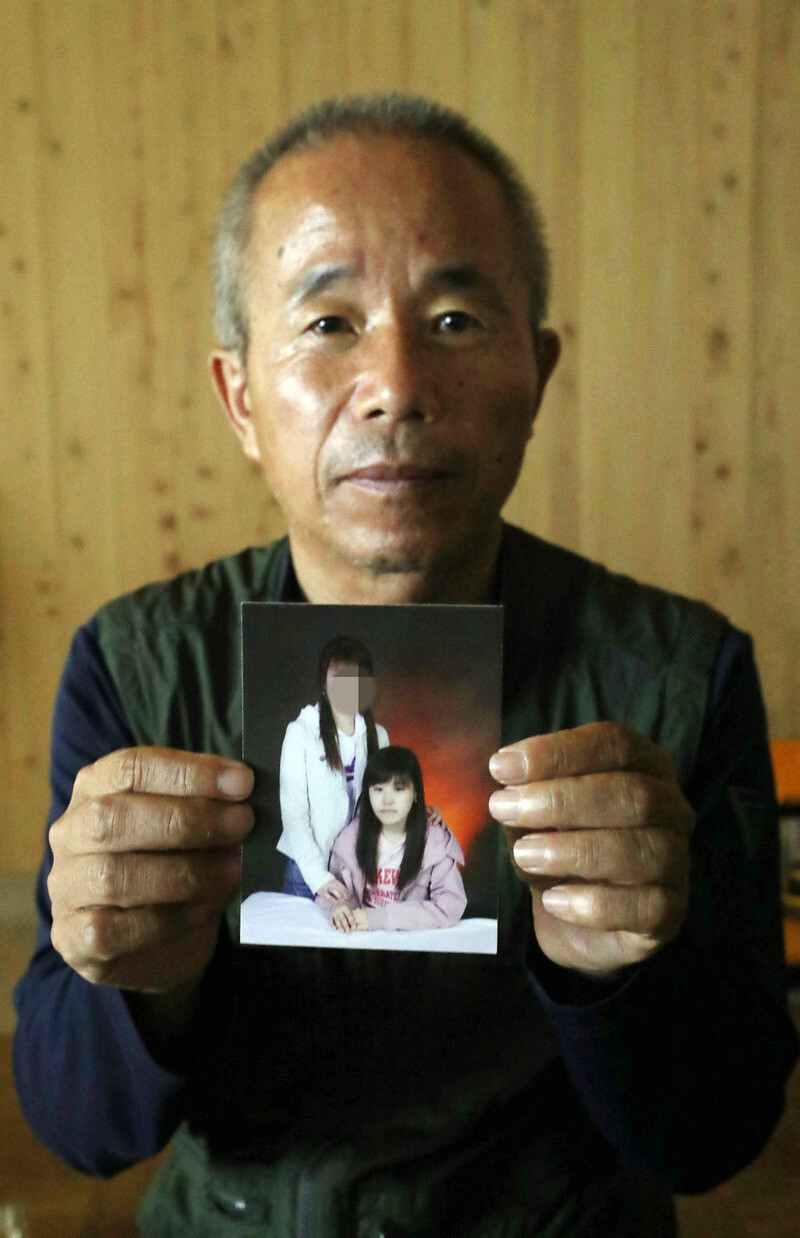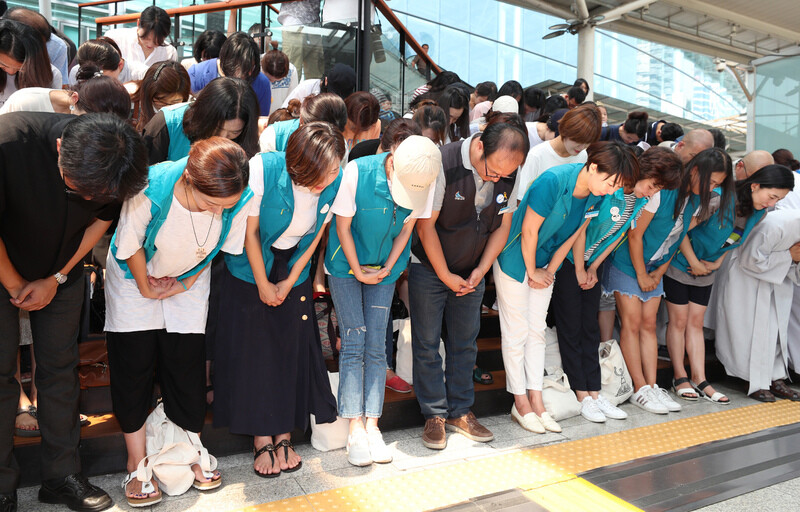hankyoreh
Links to other country sites 다른 나라 사이트 링크
Samsung leukemia and KTX cases finally nearing a close after more than 10 years

“In ten years, even landscapes can change,” a Korean saying goes – and now some major labor-related issues are finally approaching their resolution after a decade without progress. One hundred eighty KTX crew members dismissed 12 years ago are returning to the job as regular workers, and an agreement on an arbitration plan for the conflict over leukemia cases among Samsung Electronics workers looks imminent, whereas an apology and compensation seemed unlikely ten years ago.
It’s a weight off the shoulders of people who have struggled for years with frustrations on the streets, in courtrooms – and sometimes at the scene of high-wire protests. It’s also comes thanks to perseverance and resistance, unbowed by the formidable barriers of vested interests.
“I’m still hesitant to talk about it.”
Hwang Sang-ki, father of late Samsung Electronics leukemia victim Hwang Yu-mi, remained quiet after the company announced on July 22 that would accept the arbitration plan of the Arbitration Committee for Resolution of the Leukemia and Other Occupational Disease Issue at Samsung Electronics Workplaces. Racing through his head were all the difficult experiences he faced over the 11 years since his daughter passed away.
After a recommendation put forth by the committee in July 2015 ended up falling through, Hwang and the semiconductor workers’ health and human rights watchdog group Banollim had to spend another 1,020 days holding a sit-down strike in front of the Samsung Electronics head office.
Keeping a promise to his deceased daughter
This time, even Hwang appeared optimistic that the long battle was over.
“When our Yu-mi was still alive, I made a promise to find out what made her sick. Everything that has happened so far started with that promise to Yu-mi.”
Now it looks as though Hwang will be able to honor that promise soon. The chances of arbitration falling through are slim enough for both Samsung Electronics and Banollim to announce their intention of agreeing to the committee’s arbitration plan when it emerges in a little over two months. The committee, Banollim, and Samsung Electronics were also scheduled to hold a signing ceremony on the morning of July 24 to agree on the meditation approach.
On July 22, the area around the sit-down strike in front of Samsung Electronics was broiling hot. It was difficult to breathe in the weather - but the looks on the participants’ faces were fairly positive.
“After holding out so firmly, it now looks like Samsung is finally bowing its head,” said labor attorney Cho Seung-gyu, 27, who has been working to “watch over” the Banollim sit-down strike since early this year.
“Banollim has already changed a lot of things. This may be the start of a change for Samsung,” he added hopefully.
A Samsung official said, “With the conflict over leukemia cases going on unresolved for the past ten years, I think we saw the arbitration plan presented by the Arbitration Committee as a last opportunity.”
“I was very bitter at first – we’d had the ‘candlelight revolution,’ yet it seemed like our particular world wasn’t changing. [Now] I’ve come to embrace the hope that our society is transforming.”

This was the response shared by Kim Seung-ha, head of the Korean Railway Workers’ Union (KRWU) KTX crew chapter, during a press conference at Seoul Station on the afternoon of July 21 following her reinstatement after 12 years and two months. Hearing news of the decision, crew members at the site of a sit-down protest in a tent at Seoul station were in tears, embracing one another over a victory 4,256 days in the making, she said.
Kim and her colleagues hadn’t had an easy day over the 12 years since 2006. In the summer of 2008, they staged a high-wire protest for over 20 days on a 40-meter pylon at Seoul Station; in 2015, they experienced the suicide of a colleague whose struggle was frustrated by a Supreme Court decision.
Remembering those who can’t share in the victory
Kim mentioned the example of a crew member surnamed Park who committed suicide in despair after the Supreme Court sided with the company in 2015, overturning a lower-court ruling. The wages received from victories in the first and second trials and the legal costs were difficult to cope with, she explained.
“I want to tell the friend who couldn’t be here with us for this joyous moment that we were right, we were justified,” Kim said.
“There’s nothing we can do to make up for it, but I think it’s our final contribution to our friend to join forces in turning back this judicial abuse,” she added.
The ruling on KTX crew members was mentioned in a document alleging “transactions” in Supreme Court cases while Yang Sung-tae was serving as Chief Justice, and is currently under investigation by prosecutors.
The resolution of these longstanding cases is drawing new attention to other issues that have dragged out for the past decade or so – most notably that of layoffs at Ssangyong Motor. Thirty dismissed workers and their family members have passed away since the large-scale layoffs in 2009. During a visit to India as a guest of the state earlier this month, President Moon Jae-in met with chairman Anand Mahindra of the Mahindra Group – Ssangyong’s majority shareholder – to plead for a solution on the worker reinstatement issue, but the company remains adamantly opposed.
By Lim Jae-woo, Park Ki-yong and Choi Hyun-june, staff reporters
Please direct comments or questions to [english@hani.co.kr]

Editorial・opinion
![[Guest essay] The real reason Korea’s new right wants to dub Rhee a founding father [Guest essay] The real reason Korea’s new right wants to dub Rhee a founding father](https://flexible.img.hani.co.kr/flexible/normal/500/300/imgdb/original/2024/0423/8317138574257878.jpg) [Guest essay] The real reason Korea’s new right wants to dub Rhee a founding father
[Guest essay] The real reason Korea’s new right wants to dub Rhee a founding father![[Column] ‘Choson’: Is it time we start referring to N. Korea in its own terms? [Column] ‘Choson’: Is it time we start referring to N. Korea in its own terms?](https://flexible.img.hani.co.kr/flexible/normal/500/300/imgdb/original/2024/0423/3617138579390322.jpg) [Column] ‘Choson’: Is it time we start referring to N. Korea in its own terms?
[Column] ‘Choson’: Is it time we start referring to N. Korea in its own terms?- [Editorial] Japan’s rewriting of history with Korea has gone too far
- [Column] The president’s questionable capacity for dialogue
- [Column] Are chaebol firms just pizza pies for families to divvy up as they please?
- [Column] Has Korea, too, crossed the Rubicon on China?
- [Correspondent’s column] In Japan’s alliance with US, echoes of its past alliances with UK
- [Editorial] Does Yoon think the Korean public is wrong?
- [Editorial] As it bolsters its alliance with US, Japan must be accountable for past
- [Guest essay] Amending the Constitution is Yoon’s key to leaving office in public’s good graces
Most viewed articles
- 1[Guest essay] The real reason Korea’s new right wants to dub Rhee a founding father
- 2Terry Anderson, AP reporter who informed world of massacre in Gwangju, dies at 76
- 3[Column] ‘Choson’: Is it time we start referring to N. Korea in its own terms?
- 4Why Korea shouldn’t welcome Japan’s newly beefed up defense cooperation with US
- 5[Column] The clock is ticking for Korea’s first lady
- 6[Editorial] Japan’s rewriting of history with Korea has gone too far
- 7Opposition calls Yoon’s chief of staff appointment a ‘slap in the face’
- 8Video evidence surfaces showing Korean comfort women were massacred by Japanese military
- 9Senior doctors cut hours, prepare to resign as government refuses to scrap medical reform plan
- 10New AI-based translation tools make their way into everyday life in Korea